Marchés
Lors de la conception d’une intervention humanitaire et de la prise de décisions quant à l’utilisation des transferts monétaires, l’analyse générale des options de réponse doit inclure une analyse de marché. Il est prouvé qu’offrir un soutien ciblant le fonctionnement des marchés accélère la reprise et accroît la résilience dans les zones affectées par une catastrophe.
De nombreuses organisations ont investi dans la mise au point d’outils visant à faciliter l’analyse de marché et réfléchissent à la mise en place de programmes basés sur les marchés plus holistiques. Elles envisagent des interventions tirant profit du marché (basées notamment sur des transferts monétaires aux populations affectées), ainsi que des interventions soutenant directement les marchés (comme l’octroi de subventions conditionnelles aux vendeurs/euses pour la remise en condition du marché).
Initiatives associées
Contenu associé

1.2 Introduction à l’analyse de marché
Cours
Ce cours de 30 minutes offre une introduction à l’analyse de marché pour les contextes d’urgence. Il contient des contributions d'experts dans ce domaine. Ce cours a été développé en collaboration avec l'International Rescue Committee et le CALP Network et grâce au financement d’USAID/OFDA et de l’Agence Suisse pour le Développement et la Coopération. Il est destiné aux...

2.4 Un guide pratique pour l’analyse de marché
Cours
Ce cours en ligne de 3.5 heures vise à fournir aux équipes qui conduiront des analyses de marchés en contextes humanitaires une compréhension approfondie de la théorie et des étapes à suivre afin de leur permettre de comprendre le pourquoi et le comment du processus à suivre. Les participants seront guides à travers un scenario d'analyse de marchés d'urgence. Ce cours s'appuie sur...
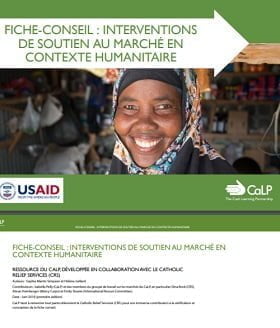
Fiche-Conseil : Interventions de soutien au marché en contexte humanitaire
Guides et outils
La fiche conseil définit le programme de soutien au marché en contexte humanitaire et le décrit dans la pratique. Elle permet aux praticiens humanitaires d’envisager systématiquement des interventions de soutien au marché, parallèlement à d’autres activités du programme. Le champ d’application comprend des interventions de soutien au marché axées sur l’offre/la disponibilité...
Thematic lead
Latest

The Supply Chain in Cash and Voucher Programmes
Presentation
This video explains how supply chains play a critical role in cash and markets based humanitarian programmes. Everything we do in a crisis has an impact on local markets; cash and voucher based assistance only works when we monitor markets and maintain our own supply chain for when it’s needed.

Insufficient Evidence? The Quality and Use of Evidence in Humanitarian Action
Report
This paper (and the ALNAP meeting on which it is based) is underpinned by the sense that ‘at present, humanitarian decisions are often based on poor information’ (DFID, 2012: 5) and are ‘anecdote, rather than evidence, driven’ (Mazurana et al., 2011: 1). Even when evidence is available, decisions...

Protéger la vie privée des bénéficiaires: Principes et normes operationnelles pour une utilisation securisee des donnees personnelles dans les programmes de transfert monetaire et electronique
Rapport
Les transferts électroniques sont porteurs de risques inhérents relatifs à la collecte et au traitement des données personnelles des bénéficiaires. Toutefois, à ce jour, ces risques sont largement méconnus et ils font l’objet de peu de solutions. Les pratiques des organisations sont rarement...

L’analyse de marché en situation d’urgence
Rapport
Malgré la quantité d’outils disponibles et d’innovations dans la conception de programmes, la communauté humanitaire fait face à certaines difficultés dans l’intégration des résultats d’analyses de marché dans la planification des programmes en situations de crise. Ce document...

Les transferts monétaires dans les situations d’urgence en milieu urbain: boîte à outils (Annexe 2)
Guides et outils
Cette boîte à outils a été rassemblée dans le cadre de la recherche “Les transferts monétaires en situation d’urgence urbaine“. Vous pouvez soit télécharger l’ensemble de la boîte à outils (fichier .zip) soit sélectionner un outil de la liste ci-dessous: Outil 1: Exemple de...
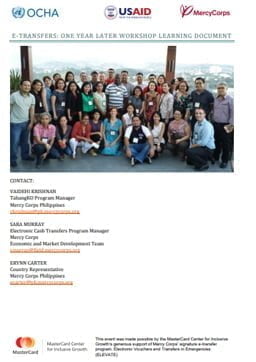
E-Transfers: One Year Later Workshop Learning Document
Report
In the aftermath of Typhoon Haiyan (known locally as Typhoon Yolanda), an estimated half million storm-affected Filipinos received an electronic cash transfer (e-transfer) to help them rebuild and recover from the storm’s devastation. The presence of a large number of Financial Service Providers...
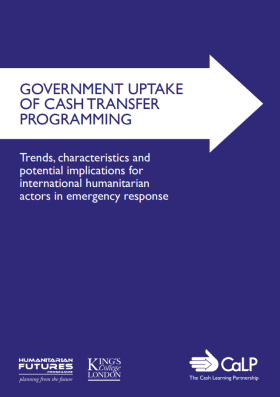
Government Uptake of Cash Transfer Programming: Trends, characteristics and potential implications for international humanitarian actors in emergency response
Policy paper
Trends, characteristics and potential implications for international humanitarian actors in emergency response. This thematic report has been undertaken as part of a 2013 research study entitled, Is Cash Transfer Programming ‘Fit for the Future’? The research was commissioned by the the CALP...
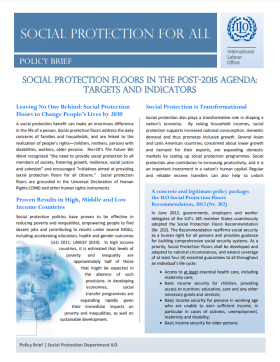
Social Protection Floors in the Post-2015 Agenda: Targets and indicator
Policy paper
A policy brief outlining the post-2015 targets and indicators for social protection. To be transformational and make a real difference in people’s lives by 2030, two issues are critical: (1) universal coverage, for all, and (2) adequate benefits, ensuring that at least all in need receive sufficient...
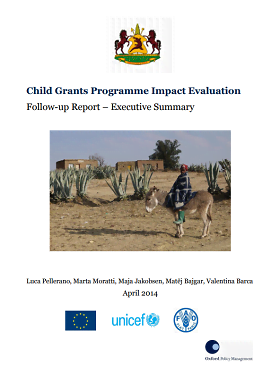
Child Grants Programme Impact Evaluation Follow-up Report – Executive Summary
Case Study
The Lesotho Child Grants Programme (CGP) is an unconditional social cash transfer targeted to poor and vulnerable households. It provides every quarter a regular transfer of between M360 and M7501 to poor households with children that are selected through a combination of Proxy Means Testing (PMT) and...
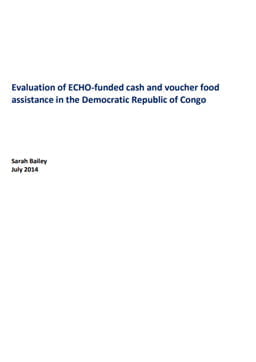
Evaluation of ECHO-Funded Cash and Voucher Food Assistance in the Democratic Republic of Congo
Report
People in eastern Democratic Republic of Congo (DRC) have long faced protracted conflict and instability resulting in the displacement of populations. In order to provide households affected by new displacements with timely access to food, ECHO funded the Norwegian Refugee Council (NRC), the Association...
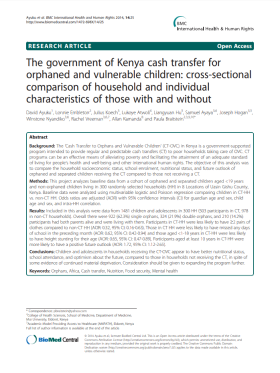
The Government of Kenya Cash Transfer for Orphaned and Vulnerable Children: Cross-sectional Comparison of Household and Individual Characteristics of Those With and Without
Report
The ‘Cash Transfer to Orphans and Vulnerable Children’ (CT-OVC) in Kenya is a government-supported program intended to provide regular and predictable cash transfers (CT) to poor households taking care of OVC. CT programs can be an effective means of alleviating poverty and facilitating the attainment...

Les Transferts d’Argent par Téléphonie Mobile et par IMF pour les Réfugiés Urbains à Niamey (Niger)
Rapport
Cette étude a comparé l’efficacité des transferts d’argent par téléphonie mobile et les transferts de cash par l’Institution de Micro-Finance aux réfugiés urbains à Niamey. L’étude a révélé que le mécanisme de transfert d’argent par téléphonie mobile serait plus rentable que le...
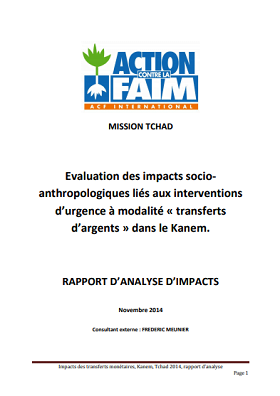
Évaluation des impacts socio-anthropologiques liés aux interventions d’urgence à modalité « transferts d’argents » dans le Kanem – Rapport d’analyse d’impact
Rapport
Ce rapport reflète les constats perçus par l’évaluateur externe sur les impacts des actions de transferts monétaires sans contrepartie dans la région du Kanem et dans le cadre existant des projets en 2014. Les mesures de mitigations des impacts négatifs sont formulées dans le cadre de la...
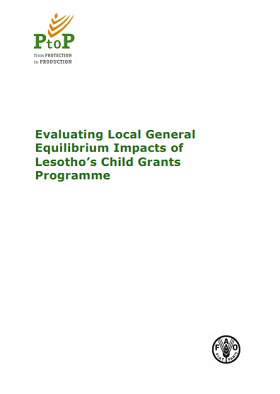
Evaluating Local General Equilibrium Impacts of Lesotho’s Child Grants Programme
Report
This report presents findings from a local economy-wide impact evaluation (LEWIE) of Lesotho’s Child Grants Programme. Simulations indicate that total income impacts significantly exceed the amounts transferred under the programme: each loti transferred stimulates local nominal income gains of up to...
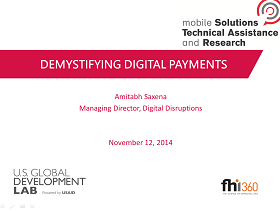
Demystifying Payments – mStar
Report
In its simplest form, a payment is any exchange of value between two parties, where usually Party A offers a form of currency in exchange for a good or service provided by Party B. The advent of nation-states issuing fiat currency, such as paper bills and bronze coins, which unlike gold or silver...
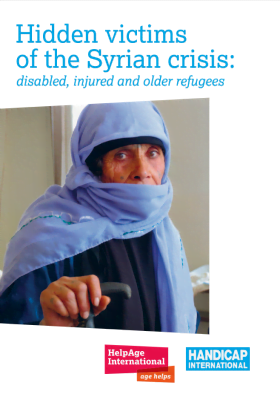
Hidden Victims of the Syrian Crisis: Disabled, injured and older refugees
Report
The Syrian crisis has generated the largest refugee movement since the Rwandan genocide and is described as the defining refugee crisis of our era. According to the United Nations High Commissioner for Refugees, Antonio Guterres, Syrian refugees are about to replace Afghans as the world’s largest...

Support to the local tool market post-Typhoon Haiyan
Report
Super Typhoon Haiyan struck Leyte and Eastern Samar in the Philippines in November 2013. CRS responded by initiating a program in 2014 to support the livelihoods recovery of 5,250 agriculture-based households. The Livelihood Early Recovery Support to Agricultural Households Affected by Typhoon Yolanda...
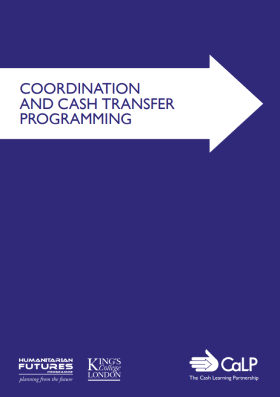
Coordination and Cash Transfer Programming
Policy paper
This thematic report has been undertaken as part of a 2013 research study entitled, Is Cash Transfer Programming ‘Fit for the Future’? The research was commissioned by the the CALP Network and undertaken by the Humanitarian Futures Programme (HFP), King’s College London. The overall...
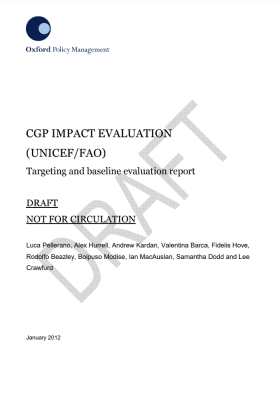
CGP Impact Evaluation (UNICEF/FAO): Targeting and baseline evaluation report
Report
The Child Grants Programme (CGP) is an unconditional cash transfer targeted to poor and vulnerable households in Lesotho. The primary objective of the CGP is to improve the living standards of Orphans and Vulnerable Children (OVC) so as to reduce malnutrition, improve health status, and increase school...
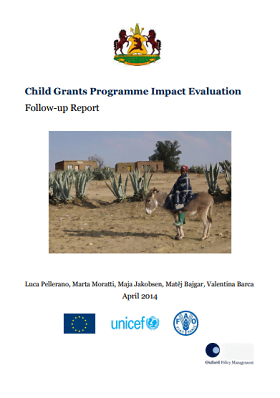
Child Grants Programme Impact Evaluation Follow-up Report
Report
The Lesotho Child Grants Programme (CGP) is an unconditional social cash transfer targeted to poor and vulnerable households. It provides every quarter a regular transfer of between M360 and M7501 to poor households with children that are selected through a combination of Proxy Means Testing (PMT) and...
